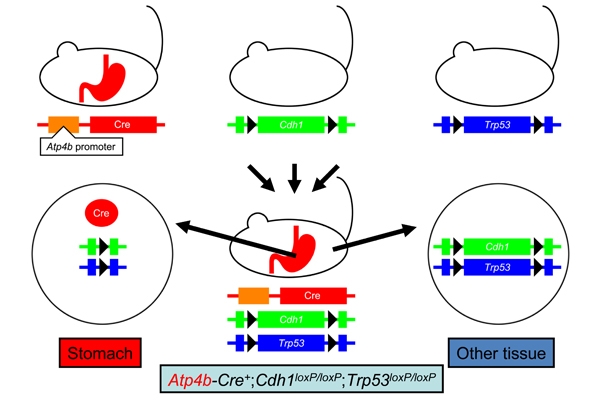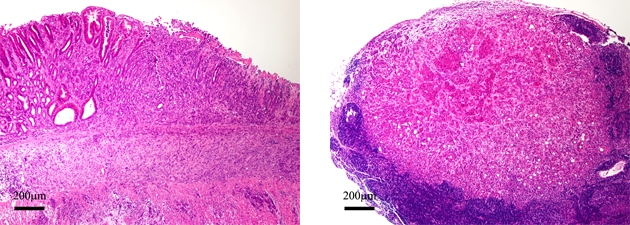“The first genetically engineered mouse model of diffuse-type gastric cancer”

Yasuhito Yuasa
Professor, Department of Molecular Oncology
Graduate School of Medical and Dental Sciences (right)
Shu Shimada
Assistant Professor,
Department of Molecular Oncology
Graduate School of Medical and Dental Sciences (left)
Intramucosal cancers and invasive cancers composed of poorly differentiated carcinoma cells and signet ring cells, histologically very similar to those in humans, were found from 6 and 9 months, respectively. Fatal DGCs developed at 100% penetrance within a year, and frequently metastasised to lymph nodes. Gene expression profiles of DGCs in the double conditional knockout (DCKO) mice also resembled those of human DGCs.
Our mouse line is the first genetically engineered mouse model of DGC and very useful for clarifying the mechanism underlying gastric carcinogenesis, and provides a new approach to the treatment and prevention of DGC.

Figure 1.
We crossed Atp4b-Cre mice with Cdh1-loxP and Trp53-loxP mice, and established Atp4b-Cre+;Cdh1loxP/loxP;Trp53loxP/loxP DCKO mice. E-cadherin and p53 are specifically inactivated in the gastric parietal cell lineage in DCKO mice, and these cells can undergo malignant transformation.

Figure 2.
Infiltrating gastric cancer cells are distributed from the mucosal layers to the muscularis propria (left), as well as lymph node metastases are frequently observed in DCKO mice (right).
Publication information
Shu Shimada, Ayako Mimata, Masaki Sekine, Kaoru Mogushi, Yoshimitsu Akiyama, Hiroshi Fukamachi, Jos Jonkers, Hiroshi Tanaka, Yoshinobu Eishi, Yasuhito Yuasa
Gut, in press.
Gut doi:10.1136/gutjnl-2011-300050.
Contact
| Yasuhito Yuasa, M.D., Ph.D. Department of Molecular Oncology, Graduate School of Medical and Dental Sciences, Tokyo Medical and Dental University, 1-5-45 Yushima, Bunkyo-ku, Tokyo, Japan E-mail; yuasa.monc@tmd.ac.jp URL: http://www.tmd.ac.jp/grad/monc/english/index.html |

